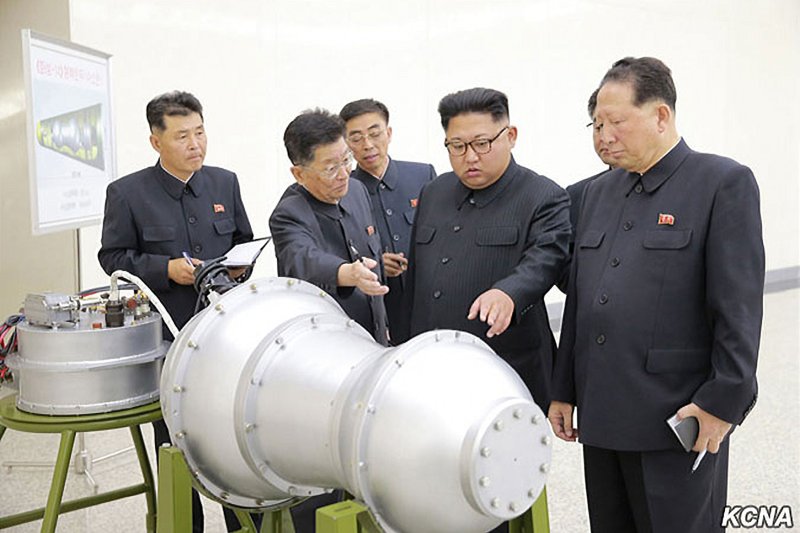1 of 2 | This image released in September 2017 by the North Korean Official News Service (KCNA) shows North Korean leader Kim Jong Un during a briefing by scientists at the Nuclear Weapons Institute on the details of the country's nuclear weaponization program. File Photo by KCNA/UPI |
License Photo
NEW YORK, May 24 (UPI) -- North Korea's dismantlement of its nuclear site in Punggye-ri is symbolic but ultimately does not guarantee the regime will end nuclear testing or comply with U.S. calls for denuclearization, analysts say.
Frank Aum, a senior North Korea expert at the United States Institute of Peace in Washington, told UPI in a recent phone interview North Korea's demolition event, scheduled for Thursday, leaves options open for Pyongyang.
"By closing down that test site, it doesn't prevent North Korea from conducting additional tests because there are other tunnels and pristine rock within that mountain complex that are still usable for tests," Aum said.
But Aum, a former senior adviser on North Korea at the Pentagon, said the offer to dismantle the site, a good faith gesture, is not insignificant.
"There is a big sort of public messaging aspect to it rather than a sincere intent to forgo nuclear testing, but that being said, I feel like, even then they didn't have to do this."
Duyeon Kim, a U.S. analyst with the Korean Peninsula Future Forum, said the gesture is hardly a concession.
Kim, who is based in Seoul, said the dismantlement sparked déjà vu of a past event: North Korea's 2008 destruction of a cooling tower at Yongbyon nuclear research center.
Pyongyang later tested a nuclear device in 2009.
"The North doesn't need Punggye-ri anymore," Kim said in New York during a discussion at the Japan Society on Tuesday. "There are other ways of refining nuclear technology. Advanced nuclear powers do not need to conduct tests."
Commotion over the dismantlement that began with invitations to foreign journalists, North Korean retraction of invitations to South Korean reporters -- only to permit their travel at the last minute -- is taking place with a highly anticipated summit between U.S. President Donald Trump and Kim Jong Un less than three weeks away.
During a meeting with South Korean President Moon Jae-in on Tuesday, Trump said there is a "substantial chance" the summit won't take place, adding uncertainty to future prospects.
For its part, North Korea has not helped alleviate tensions.
Most recently, Pyongyang took aim at Vice President Mike Pence for suggesting North Korea may end up like Libya if it does not strike a nuclear deal that agrees with the United States.
But beyond the kerfuffle, both sides are ready to talk, Aum said.
"President Trump and Kim Jong Un are very much invested in having a summit," the analyst said. "Trump would have an opportunity to appear very statesmanlike, and using diplomacy to resolving the North Korean issue is something that a lot of Americans support.
"Likewise Kim Jong Un gains legitimacy and propaganda value from meeting with a sitting U.S. president."
Duyeon Kim, who recently told The New York Times the summit will be a success because "Trump will package, sell and call it a success to his supporters," said a good outcome of the meeting would be a "very simple vision statement" that could "keep the door to the diplomatic process open.
"I would be OK if the two leaders walked away from this particular summit and say we'll meet again until we have an agreement," she said.
Success of the summit hinges on whether the two sides come to an agreement on denuclearization, but Aum said it is not clear whether North Korea subscribes to the same definition of denuclearization as the United States.
"North Korea talks about a process that includes progressive and synchronous steps, so they're talking about more of a phased process that may take several years," he said. "President Trump and [State Secretary Mike] Pompeo have talked about a non-protracted process. They're thinking of something on the immediate end."
These somewhat opposing views are a cause for concern ahead of the summit, and Moon, who met with Trump on Tuesday, has been occupied with playing mediator.
Moon, a progressive leader who has favored engagement even at the peak of tensions, wants to leave a legacy of peace.
"He wants to finish the unfinished business of his two predecessors" Kim Dae-jung and Roh Moo-hyun, said Duyeon Kim.
"His primary interest really is ultimately peace on the Korean Peninsula."
Aum said Moon's message to Trump is, take it easy.
"I think where South Korea lies is somewhere in the middle and I think that's something President Moon will try to convince President Trump on," Aum said, ahead of the meeting.
Moon will say, "the process should be phased, it should require concessions on both sides.
"At the same time it has to be accelerated and not an extended process like we had in the past."
Trump and Kim are planning to meet June 12 in Singapore.
(Correction: An earlier version of this article identified U.S. analyst Duyeon Kim as South Korean.)















